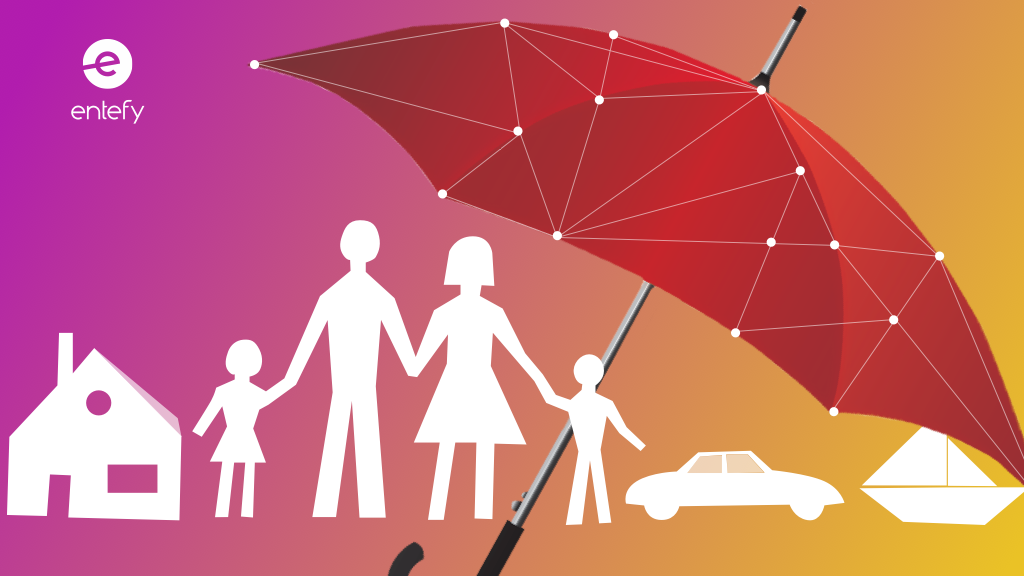Do you have car insurance? Health insurance? Homeowners insurance? Chances are you are a customer of at least one insurance company and a policyholder on one or more types of insurance. If so, you should pay particular attention to the fact that the global insurance industry is seeking to harness artificial intelligence solutions. While the use of AI technologies in insurance has the potential to streamline company operations and reduce consumer prices, it also raises unprecedented new issues about personal privacy.
As with many discussions of artificial intelligence, understanding its impact starts with understanding data. AI systems used by businesses analyze data (the more the better) to discover trends and insights in that data. Those insights can then be used to improve a company’s operational efficiency, for instance. This is true of everything from online dating systems to healthcare platforms.
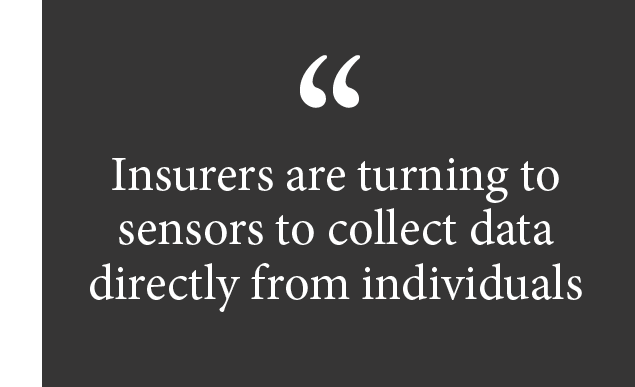
What’s distinctive about the insurance industry’s adoption of AI is how these companies intend to collect their data. Insurers are turning to sensors to collect data directly from individuals, including technologies like in-home monitors and wearables. And whenever data collection intersects with a real person, privacy questions emerge. Do you want your healthcare provider receiving a real-time notification of your late-night snacking? Do you want your auto insurer to know every time you roll through a stop sign? These are no longer hypotheticals.
Consumers should pay attention because the more data insurance companies collect about their lives, the less control they are likely to have over how that information is used. The question is, how much of this data about your personal life will you be asked to volunteer? And more importantly, will you have a choice?
Privacy issues raised by smart auto insurance
Auto insurers have already made strides in exploring how AI can lower costs for themselves and their customers. Several companies are developing smart photo analysis systems capable of assessing vehicle damage immediately following an accident. Telematics—computing devices that transmit data over long distances—may lead to advancements like detecting crashes, assessing damage, and starting claims. In-vehicle or smartphone-enabled telematics devices could trigger 911 calls and instruct company representatives to call policyholders and help them through their post-crash recovery.
While a supportive presence might be welcome during such circumstances, instant notification comes with drawbacks. Right now, policyholders have the option of calling their providers right away or holding off until they’ve taken their cars to a mechanic. Some opt out of reporting accidents altogether if the damage is minimal. An instant alert system means insurance companies gain control over the situation. For example, they could insist policyholders take their cars to a preferred auto body shop instead of letting customers make the decision.
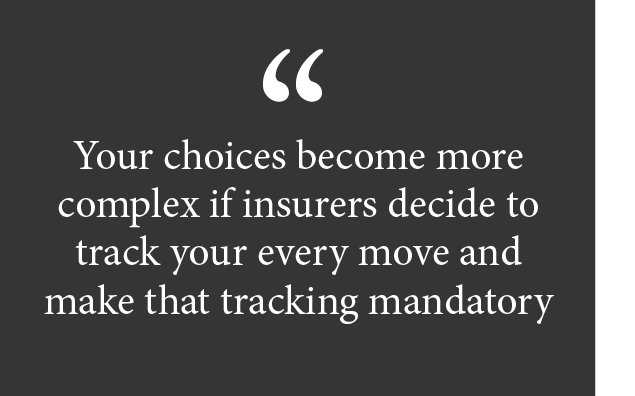
Insurance companies also use telematics to track policyholders’ activities, offering a chance at reduced premiums in exchange for providing real-time data about their driving behavior. However, decreased premiums aren’t guaranteed. Some companies even calculate rates based on factors unrelated to performance. Drivers could have pristine records but still pay high fees if insurers think they visit dangerous neighborhoods too often.
Policyholders can in many cases opt out of tracking programs and forgo rate discounts. But your choices become more complex if insurers decide to track your every move and make that tracking mandatory, denying coverage to those who refuse to participate.
Insurance companies in every home, and on every wrist
AI-based initiatives in the health and homeowners insurance industries raise a unique set of privacy challenges.
Wearable devices are being used in health insurance, where they transmit data about how often a person exercises and what preventive measures they take to avoid disease. AI algorithms could use that data to adjust premiums on an individualized basis, rewarding proactive policyholders with favorable rates or raising premiums for the unhealthy.
Some tech companies are working on trackers that can perform real-time measurement of glucose levels based on what people eat. That would be valuable information for insurers who want to predict which policyholders are at risk for diseases such as diabetes. But do people want their employers or insurance companies knowing about the bacon donut they ate for breakfast or the ice cream they splurged on late one night? These are the types of choices consumers could soon have to make.
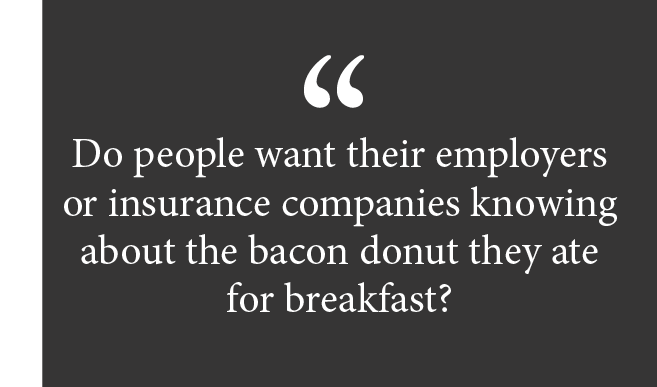
To get even more personal, let’s look at smart homes. Some insurance companies are creating policies that use data generated by your smart home to determine premiums. Other insurance companies want to subsidize the cost of adding smart home technologies. Devices such as intelligent thermostats, voice-activated assistants, mold monitors, wired refrigerators, and smart window blinds do more than add automation and convenience to people’s homes. From an insurer’s perspective they “open up a flood of lucrative new data that can make their existing business of handling claims more efficient while creating a new relationship with the customer. With a feed of data from your home, an insurer could help you prioritize maintenance tasks and fix problems such as leaky pipes before they caused major damage.” They could also save lives and lower insurance payments. For instance, in-house sensors could let residents know if the building is losing heat or sprinklers could automatically switch on in case of fire.
Now for the trade-off: “data from smart home devices can show whether you are home or not, aiding burglaries. Perhaps more likely, ransomware could attack a particular device—for example, turning off the heat until a homeowner paid up.” This is not to suggest that ransomware hackers should be top of mind. Rather, data-driven advances in insurance raise questions about data security that we have never had to address.
Common ground between innovation and privacy protection
Consumers’ views on these new privacy issues are, not surprisingly, mixed. One insurance industry survey found that 78% of people would be willing to share personal data with their insurer in exchange for lower premiums and faster settlement of claims. On the other hand, a Pew Research survey on privacy and information sharing asked respondents whether they supported installing a “smart thermostat” that would monitor their movements around the home.
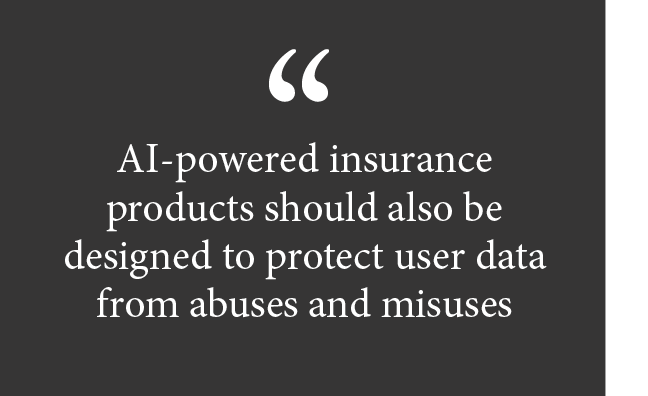
The data showed “most adults consider this an
unacceptable tradeoff (by a 55% to 27% margin). As one survey respondent explained: ‘There will be no SMART anythings in this household. I have enough personal data being stolen by the government and sold [by companies] to spammers now.’”
Incentivizing safety and prevention through sensor-driven data collection programs may one day lead to improved driving, better health, and safer homes. But AI-powered insurance products should also be designed to protect user data from abuses and misuses, limiting data collection to levels that serve consumers’ best interests.
